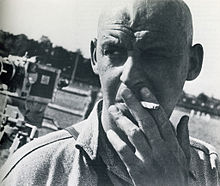Alexander Rodchenko
| Alexander Rodchenko | |
|---|---|

Rodchenko, 1935
|
|
| Born |
Aleksander Mikhailovich Rodchenko December 5, 1891 St. Petersburg |
| Died | December 3, 1956 (aged 64) Moscow |
| Nationality | Russian |
| Known for | painting, photography |
| Movement | Constructivism |
Aleksander Mikhailovich Rodchenko (Russian: Алекса́ндр Миха́йлович Ро́дченко; 5 December [O.S. 23 November] 1891 – December 3, 1956) was a Russian artist, sculptor, photographer and graphic designer. He was one of the founders of constructivism and Russian design; he was married to the artist Varvara Stepanova.
Rodchenko was one of the most versatile Constructivist and Productivist artists to emerge after the Russian Revolution. He worked as a painter and graphic designer before turning to photomontage and photography. His photography was socially engaged, formally innovative, and opposed to a painterly aesthetic. Concerned with the need for analytical-documentary photo series, he often shot his subjects from odd angles—usually high above or down below—to shock the viewer and to postpone recognition. He wrote: "One has to take several different shots of a subject, from different points of view and in different situations, as if one examined it in the round rather than looked through the same key-hole again and again."
Rodchenko was born in St. Petersburg to a working-class family who moved to Kazan after the death of his father, in 1909. He became an artist without having had any exposure to the art world, drawing much inspiration from art magazines. In 1910, Rodchenko began studies under Nicolai Fechin and Georgii Medvedev at the Kazan Art School, where he met Varvara Stepanova, whom he later married.
After 1914, he continued his artistic training at the Stroganov Institute in Moscow, where he created his first abstract drawings, influenced by the Suprematism of Kazimir Malevich, in 1915. The following year, he participated in "The Store" exhibition organized by Vladimir Tatlin, who was another formative influence.
...
Wikipedia
